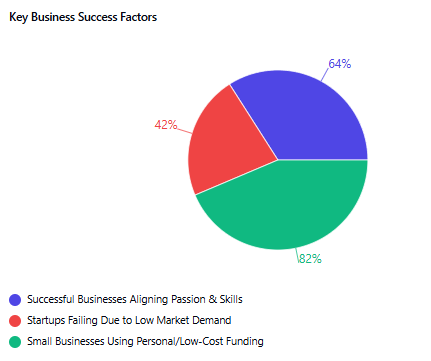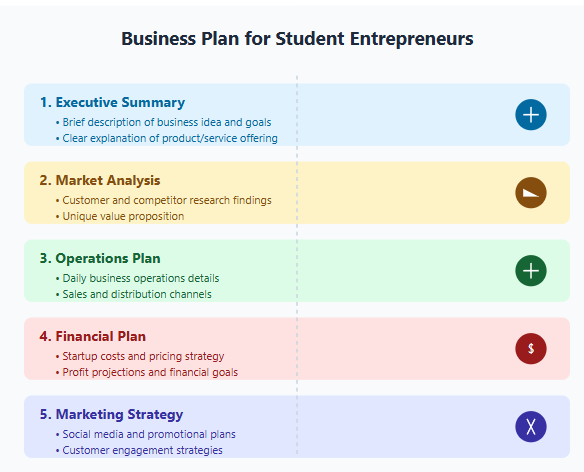Transform your free time into profits! Explore simple and creative business ideas for students to start today and grow fast. 📈
Introduction
Starting a business as a student might seem challenging, but it is one of the most rewarding decisions you can make. Whether in school, college, or university, taking the initiative to start a business helps you earn extra income and builds valuable skills such as time management, financial planning, and problem-solving.
In today’s digital world, opportunities for students are endless. Whether you’re looking for business ideas for students online, planning to establish a small business, or exploring entrepreneurship ideas for students, this guide will provide you with the knowledge and inspiration to get started.

The Advantages of Starting a Business As A Student
Starting a business while still in school or college can be exciting and rewarding. It provides a chance to explore your interests and equips you with a strong foundation for future success. Let’s take a deeper look at the main benefits.
1. Practical Learning
While classrooms provide a theoretical understanding of various concepts, starting a business allows students to apply this knowledge in real-world scenarios. For instance:
- Finance students can learn firsthand about budgeting, cash flow, and profit margins.
- Business management students can experience leadership, strategy planning, and problem-solving.
- This experiential learning bridges the gap between theory and practice, making education more relevant and engaging.
2. Financial Independence
Running a business provides students with an opportunity to earn their income. This helps in:
- Covering tuition fees, books, or other academic expenses.
- Reducing dependency on parents or loans for daily needs.
- By becoming financially independent at an early stage, students also learn the value of money and develop budgeting habits that can benefit them for life.
3. Skill Development
Entrepreneurship sharpens a range of essential skills that are valuable in any career:
- Communication: Pitching ideas to investors or clients improves confidence and clarity.
- Negotiation: Striking deals with suppliers or partners fosters strategic thinking.
- Marketing: Learning how to promote a business enhances creativity and analytical skills.
These skills support a student’sstudent’s business journey and give them an edge in the job market.
4. Future Opportunities
Launching a business as a student demonstrates initiative, creativity, and resilience—highly valued by employers and investors. It also builds a portfolio of work that can include:
- Successful projects or campaigns.
- Real results and impact statistics.
- This portfolio can make students stand out when applying for internships, jobs, or even pitching to investors in the future.
5. Networking
Running a business allows students to connect with various stakeholders, including:
- Mentors who can provide guidance and insights.
- Other Entrepreneurs who share similar experiences and challenges.
- Potential clients and partners can lead to new opportunities.
- These connections can help expand a student’s professional circle and provide valuable resources for both current ventures and future goals.
6. ICT Business Ideas as an Example
Pursuing an ICT (Information and Communication Technology) business as a student can be especially beneficial. For instance:
- Students can develop apps, websites, or software solutions for real-world challenges.
- This fosters technical expertise in coding, design, and troubleshooting.
- It also positions them as problem solvers who can create innovative solutions for modern-day issues.
The benefits of starting a business as a student include practical learning (54% of entrepreneurs credit early experiences), financial independence (67% of student entrepreneurs report better financial management), skill development (76% improve leadership and communication skills), future opportunities (70% of investors favour entrepreneurial experience), networking (25% higher business growth for active networkers), and lucrative fields like ICT, valued at $5.5 trillion with $25 million generated by student startups in 2022.

identifying the Right Business Idea for Students
Choosing the right business idea is one of the most critical steps for students looking to embark on an entrepreneurial journey. A well-selected idea can increase the chances of success while aligning with personal goals and market needs. Here’s an elaboration of the key tips to identify the right business idea, along with relevant statistics:
1. Evaluate Interests and Skills
The first step in finding the right business idea is understanding your interests and skills. Consider the following:
- What are you passionate about? Your interests can keep you motivated during challenging times.
- What skills do you already possess? Leverage existing talents to give yourself a head start.
- How can these passions and abilities be transformed into value-added products or services?
For instance, if you are good at graphic design and enjoy being creative, starting a freelance design business or creating templates for social media might be a great option.
According to a 2023 report by the Small Business Administration (SBA), 64% of successful small business owners say their ventures started by aligning their passions with their professional abilities.
2. Market Demand
Even the best business idea won’t succeed without demand in the market. Research the following to ensure your idea has potential:
- Identify gaps or unmet needs in your chosen industry.
- Find out who you’re selling to and what they require.
- Analyze competitors to determine what’s missing in their offerings.
For example, if you notice a growing demand for healthy snacks on campus, starting a business offering affordable, nutritious options could fill that gap.
Research by CB Insights reveals that 42% of startups fail due to a lack of market demand. This highlights the importance of conducting thorough market research before launching a business.
3. Low Investment Opportunities
Financial resources are often limited for students, so it’s practical to choose a business idea that requires minimal initial investment. Focus on ideas that:
- Utilize skills or assets you already have (e.g., a laptop, internet access).
- It can be started on a small scale and scaled gradually.
- Low overhead costs include freelancing, blogging, dropshipping, or tutoring services.
For example, starting an online store through dropshipping requires little to no inventory cost, making it ideal for students. Similarly, offering tutoring in subjects you excel at requires only your knowledge and time.
According to Oberlo, 82% of small businesses are funded by personal savings or family contributions, and low-cost business models can significantly reduce financial barriers to entry.

12 Unique Business Ideas for Students
Here are 12 unique business ideas that cater to various interests:
- Online tutoring services
- Social media management for small businesses
- Selling handmade crafts
- Blogging or content creation
- Developing apps or games
- Dropshipping e-commerce
- Personalized gift services
- Resume writing and career coaching
- Photography and video editing
- Event planning for student communities
- Fitness Coaching
- Digital marketing services
Market Research: How to Plan Your Business Idea
Before starting your business, you need to do some homework. This homework is called market research, and it helps you learn about the people who will buy your product, the businesses you will compete with, and how to improve your chances of success. Using tools like The QR Code Generator can also help you share surveys or product info easily during your research.
Let’s break it down into simple steps:
1. Know Your Customers
Consider who will purchase your goods or services. Ask yourself:
- Who are they? (Are they kids, students, adults, or parents?)
- What do they like or need?
- How much money can they spend?
For example, if you’re making bookmarks, your customers might be students who love to read. You can create colourful and fun designs for them!
2. Check Out Your Competition
Look at other people or businesses doing the same thing as you. Ask these questions:
- What do they sell?
- What do they do well? They may be fast or cheap.
- What could they do better? (Maybe their product isn’t unique or fun.)
For example, if your friend sells lemonade at school with only one flavour, you could sell different flavours to stand out!
3. Figure Out Your Strengths and Weaknesses
This is a “report card” for your business concept. Ask yourself:
- Strengths: What are you good at? (Are you creative, organized, or great at talking to people?)
- Weaknesses: What could be hard for you? (Do you need help with money or learning new skills?)
- Opportunities: What chances can you take? A holiday is coming, and you can sell themed products.
- Threats: What might go wrong? (Like someone else starting the same business.)
For example, if you’re good at art, you could make handmade greeting cards but may need help buying materials.
4. Ask for Feedback
You don’t have to guess what people want—ask them! Make a simple survey and share it with friends or classmates. Ask questions like:
- “Would you buy this?”
- “How much would you pay?“
- “What do you like about this idea?”
For example, if you want to sell cupcakes, ask your friends which flavours they like best.

Creating a Business Plan Tailored to Student Entrepreneurs
- Executive Summary: Write a short paragraph about your business idea and goals. For example, please explain what you want to sell and why it’s a good idea.
- Market Analysis: Share what you learned from your research. Discuss your customers, competitors, and what makes your concept distinctive.
- Operations Plan: Explain how your business will work day-to-day. For example, where will you sell your goods, and how will you distribute them?
- Financial Plan: List how much money you need to start, how you’ll price your products, and how much profit you’ll make.
- Marketing Strategy: Share your ideas to get people interested in your business. If you’re using Instagram, explain how you’ll grow followers and keep them engaged.

Securing Funding and Resources for Your Business Venture
- Bootstrapping: Start with your savings, even if they are small. For example, you can begin with just enough material to buy.
- Crowdfunding: Use websites like Kickstarter to ask people to help fund your idea. Make sure to explain why your idea is exciting.
- Student Grants: Check with your school to see if they offer free money for student entrepreneurs.
- Loans and Microfinance: Take small loans with easy payment options if needed. Many banks support student businesses.
Networking and Seeking Mentorship Opportunities
- Professors and Alumni: Your teachers and former students can give advice and connect you to helpful people.
- Entrepreneurship Clubs: Join student clubs focused on business. You can learn from others and share ideas.
- Online Communities: Platforms like LinkedIn are great for meeting people who can help your business grow.
- Find a Mentor: Look for someone with experience in the same business field to guide you through challenges.
Overcoming Challenges and Balancing School with Your Business
- Time Management: Use apps like Google Calendar to plan your schoolwork and business tasks.
- Delegate Tasks: Ask friends to help or hire part-time workers for small tasks.
- Set Realistic Goals: Break big tasks into smaller steps to make them easier to handle.
- Take Care of Yourself: Don’t forget to rest and eat well to stay healthy and focused.
Profitable Business Ideas with Low Investment for Students
- Freelancing: Use your writing, designing, or coding skills to earn money.
- Affiliate Marketing: Share links to products and earn money when someone buys them.
- Print-on-Demand Stores: Sell T-shirts, mugs, or bags with your designs, and let a third-party company handle the printing and shipping.
- Online Coaching: Teach what you know, like math or guitar, to younger students online.
Tips for Aspiring Student Entrepreneurs
- Start Small: Test your idea with a small group before spending too much money.
- Leverage Social Media: Use free platforms like TikTok or Instagram to show your product and connect with customers.
- Be Resilient: Not every idea will work, so learn from mistakes and improve.
- Stay Informed: Keep learning about the latest business trends to stay ahead.
FAQs for the Article
1. How do I choose the best business idea as a student?
Start by thinking about your skills and what you enjoy doing. Then, look for problems you can solve in your community or school. For example, you can start a healthy snack business if students need better snacks during breaks.
2. Where can students find money to start a business?
Students can use their savings, ask for help from family, or use crowdfunding websites like GoFundMe. Many schools also give grants or free money for student entrepreneurs.
3. How can I manage both school and my business?
Make a daily plan to organize your time. Focus on schoolwork first, and use the rest of your time for your business. Don’t try to do everything yourself—ask friends or family for help if needed.
4. What are some easy business ideas for students?
You can start freelancing, like designing or writing online. Selling custom products like T-shirts through print-on-demand is another great idea. Teaching younger kids online or promoting products through affiliate marketing are simple ways to begin.
5. Why is networking important for student entrepreneurs?
Networking helps you meet people who can give advice, share ideas, or even invest in your business. Joining school clubs or online communities is a great way to build connections and find mentors.
Conclusion: Empowering Student Entrepreneurs
Starting a business as a student is an empowering journey that prepares you for future success. The opportunities are endless, whether pursuing interesting business ideas for students, developing a business plan idea, or exploring service business examples for students. Remember, the skills and experiences you gain will benefit you forever.
